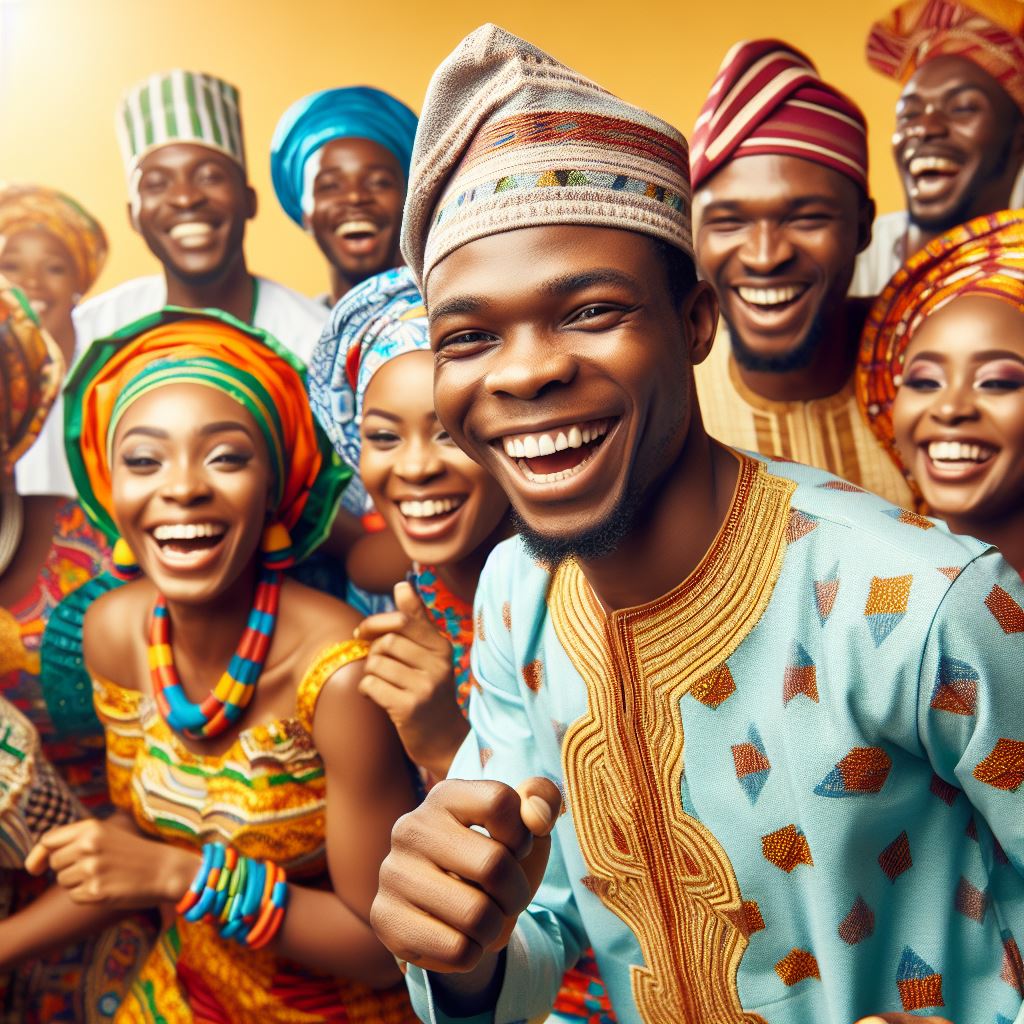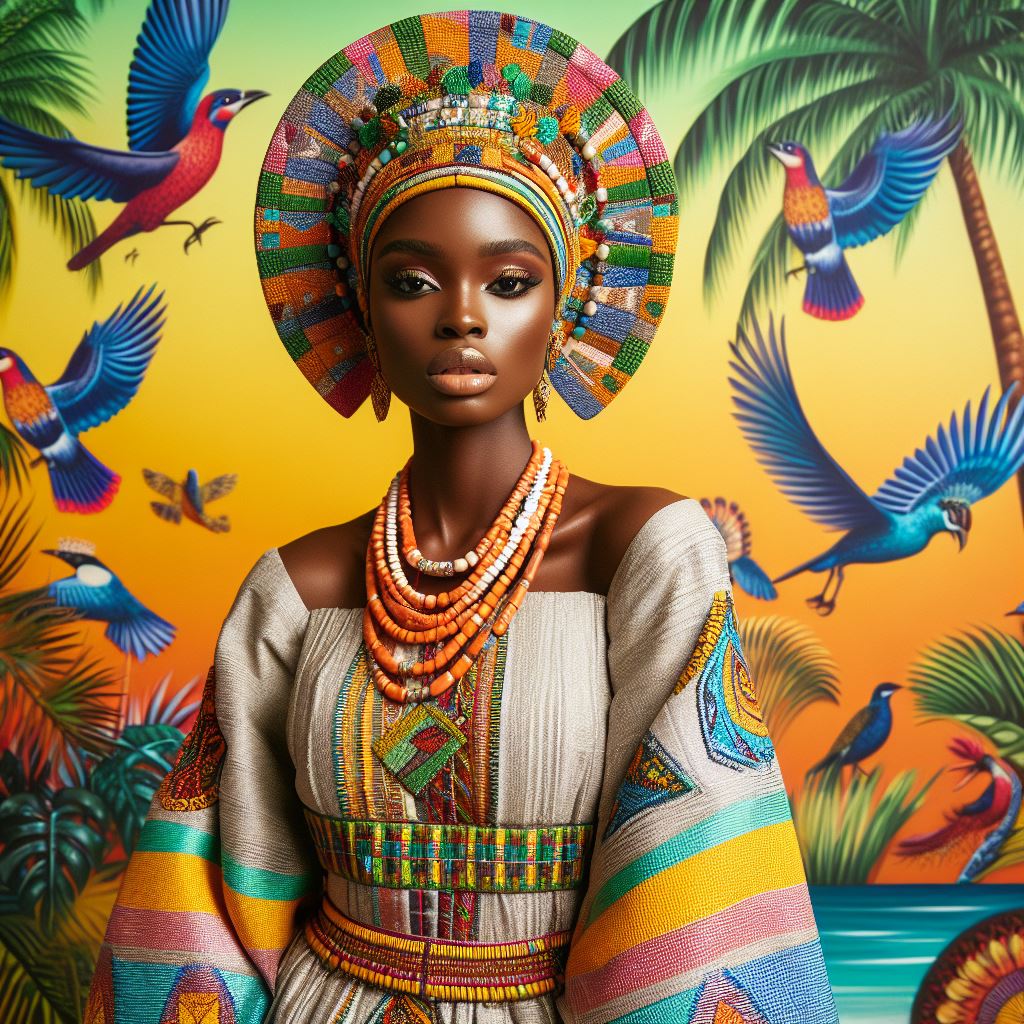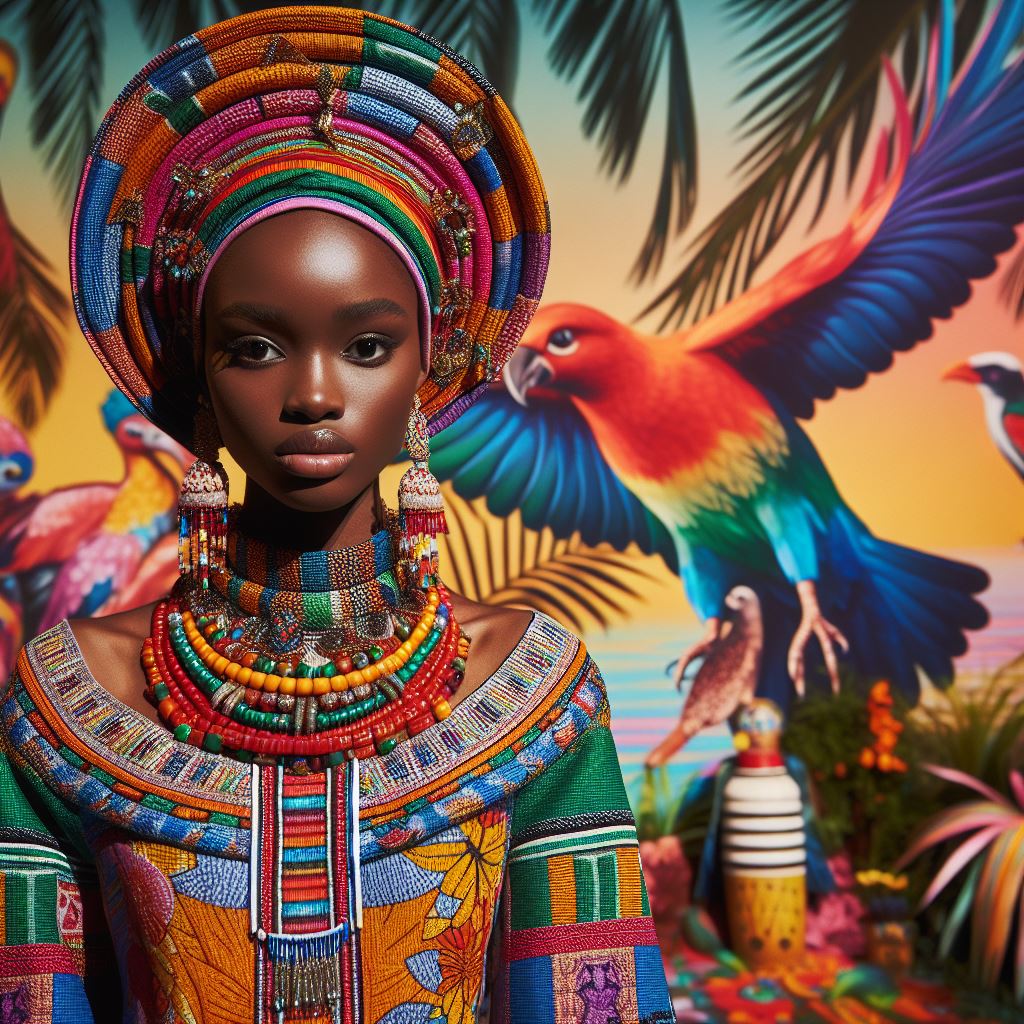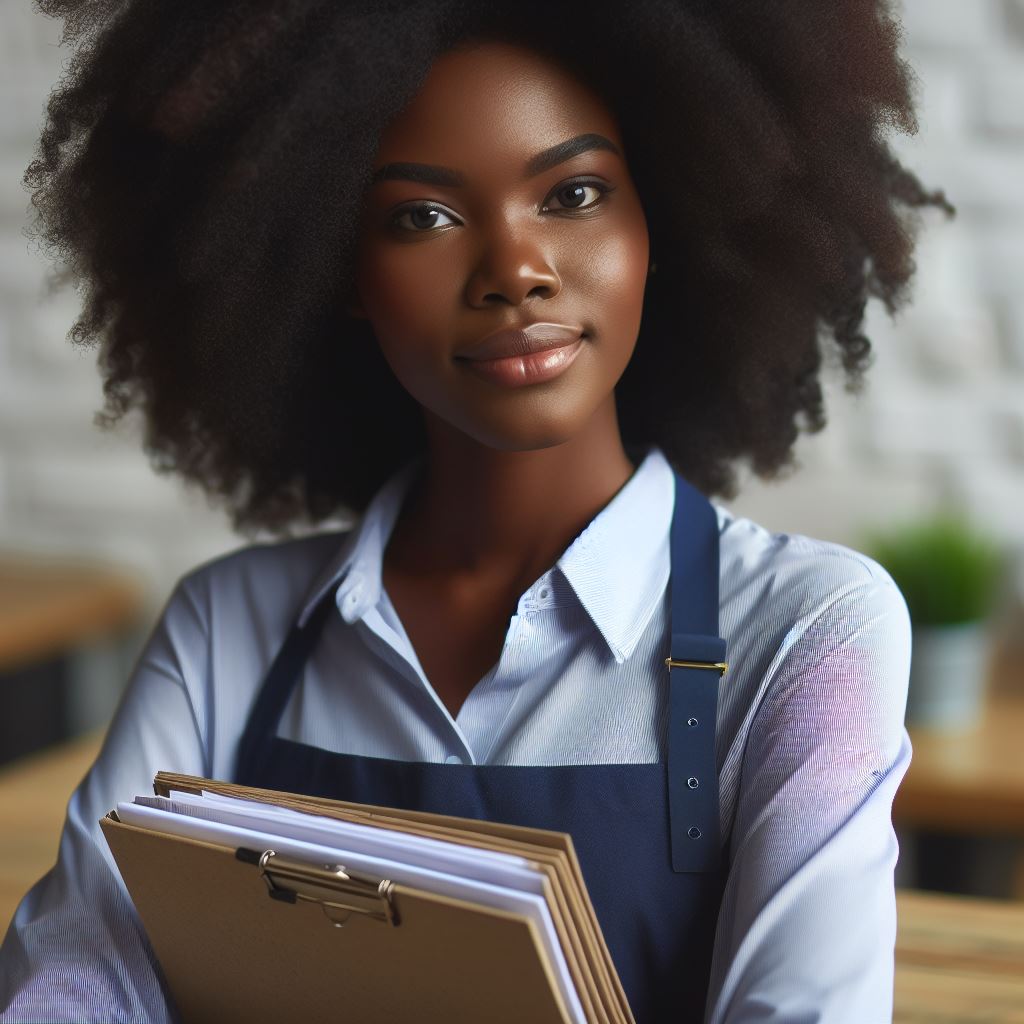Introduction
Nigerian traditional attire holds a unique place in the country’s rich cultural heritage. This attire represents the diverse ethnic groups and their distinct identities.
It reflects the customs, beliefs, and histories of the people who wear it. Traditional attire is more than just clothing; it is a cultural symbol that conveys meaning and pride.
Brief Overview of Traditional Attire in Nigeria
Nigeria boasts a wide variety of traditional clothing styles. Each ethnic group has its own unique attire. The Yoruba wear Aso-Oke, known for its rich, handwoven fabrics.
The Igbo favor the Isiagu, a traditional shirt with intricate patterns. The Hausa are renowned for their flowing robes, called Babban Riga, often paired with a cap, the Fula.
The Significance of Traditional Attire in Nigerian Culture
Traditional attire is essential in Nigerian ceremonies and festivities. It plays a key role in weddings, funerals, and festivals. Each garment tells a story, often reflecting the wearer’s status, community, and personal achievements.
These attires are not merely garments but embodiments of heritage and identity. They bring the past into the present, connecting generations through shared customs and values.
Influence on Contemporary Nigerian Fashion
The impact of traditional attire on modern Nigerian fashion is profound. Designers continuously draw inspiration from traditional patterns, fabrics, and styles.
They blend these elements with contemporary fashion trends to create unique and innovative designs. This fusion of old and new is evident in both everyday wear and haute couture.
Reviving Traditional Fabrics
Nigerian designers often use traditional fabrics like Ankara, Adire, and Aso-Oke. These fabrics are popular for their vibrant colors and patterns.
They bring a sense of cultural pride and authenticity to modern designs. By incorporating these materials, designers preserve and promote traditional textile arts.
Traditional Motifs and Patterns in Modern Designs
Modern Nigerian fashion frequently incorporates traditional motifs and patterns. These elements give contemporary pieces a distinct cultural flair.
From geometric shapes to symbolic embroidery, these patterns are rich in meaning. They provide a visual link to Nigeria’s cultural heritage, making modern designs uniquely Nigerian.
Traditional Attire in Global Fashion
Nigerian traditional attire has also influenced global fashion. International designers are increasingly incorporating Nigerian styles and fabrics into their collections.
This global recognition highlights the beauty and versatility of Nigerian traditional attire. It fosters cultural exchange and appreciation on a worldwide scale.
In general, Traditional attire remains a cornerstone of Nigerian culture. It influences modern fashion by blending heritage with contemporary style.
This integration celebrates Nigeria’s past while paving the way for innovative fashion trends. Nigerian designers, through their creative use of traditional elements, continue to honor and reinvent their cultural heritage.
Traditional attire’s enduring influence ensures that Nigerian fashion remains vibrant, diverse, and deeply rooted in its rich cultural history.
History of Traditional Attire in Nigeria
Evolution of Traditional Attire in Different Regions of Nigeria
Traditional attire in Nigeria has evolved over centuries. Each region showcases unique clothing styles reflecting its culture. In the northern regions, the Hausa-Fulani people wear flowing gowns called “Babban Riga” for men.
Women don “Zanne” or “Abaya,” often adorned with intricate embroidery. These attires symbolize modesty and elegance.
In the southwestern part, the Yoruba people are known for their vibrant “Aso-Oke” fabrics. Men wear “Agbada,” a voluminous gown, while women don “Iro” and “Buba,” complemented by “Gele” headwraps.
The rich colors and patterns signify wealth and status.
The southeastern Igbo people prefer the “Isiagu” attire for men, characterized by lion head patterns. Women wear “Wrapper” and “Blouse,” often accessorized with coral beads. These attires reflect the community’s pride and heritage.
In the Niger Delta, the Ijaw people wear traditional attire made from luxurious fabrics. Men wear “Etibo” shirts paired with “George” wrappers, while women don “Blouses” and “Wrappers” with intricate designs.
These attires signify the region’s connection to water and its resources.
Materials, Designs, and Craftsmanship of Traditional Nigerian Clothing
Nigerian traditional attire is distinguished by its materials, designs, and craftsmanship. The fabrics used are diverse and often locally sourced. “Aso-Oke” is a handwoven cloth popular among the Yoruba, made from cotton or silk.
It features vibrant colors and intricate patterns.
The Hausa-Fulani use fabrics like “Adire,” a tie-dyed cloth, and “Kente,” known for its bold, multicolored designs. These fabrics are crafted with exceptional skill, showcasing the weavers’ expertise.
Igbo traditional attire often incorporates velvet and damask fabrics.
These materials are adorned with embroidery and embellishments, reflecting the region’s craftsmanship. Coral beads and intricate jewelry are also common accessories.
The Ijaw people use luxurious fabrics like silk and satin for their attire. The designs often include elaborate patterns and beadwork, symbolizing the community’s artistic heritage.
Cultural and Historical Significance of Traditional Attire
Traditional attire in Nigeria holds immense cultural and historical significance. It is a representation of identity, heritage, and pride.
For the Hausa-Fulani, attire signifies modesty and social status. The elaborate designs and embroidery reflect the region’s rich history.
Yoruba attire, especially “Aso-Oke,” is often worn during important ceremonies like weddings and festivals. The colors and patterns convey messages about the wearer’s status and family lineage.
Igbo attire, adorned with coral beads, is symbolic of royalty and nobility. The “Isiagu” attire is often worn by chiefs and elders, reflecting their authority and respect within the community.
The Ijaw traditional attire connects the people to their environment. The use of luxurious fabrics and elaborate designs highlights the community’s prosperity and connection to water.
Traditional attire in Nigeria is more than just clothing. It is a testament to the country’s diverse cultures, rich history, and artistic heritage. It continues to influence modern fashion, preserving the essence of Nigerian identity.
Read: Communication Arts: Job Prospects and Salaries
Traditional Attire as Inspiration for Modern Nigerian Fashion
Influence on Contemporary Fashion Trends
Traditional Nigerian attire has significantly influenced contemporary fashion trends. Designers skillfully blend cultural heritage with modern styles, creating unique and vibrant pieces.
These pieces reflect Nigeria’s rich history and diverse culture. By incorporating traditional elements, designers celebrate their heritage while appealing to modern tastes. This fusion creates a distinct fashion identity, recognized globally.
Incorporating Traditional Fabrics and Patterns
Nigerian fashion designers frequently use traditional fabrics and patterns in their modern creations. Ankara, a vibrant, wax-printed fabric, is particularly popular.
It adorns everything from dresses to accessories, offering a bold statement. The intricate Aso Oke fabric, known for its handwoven texture, also features prominently in contemporary designs.
Designers utilize these fabrics to craft elegant gowns, suits, and even casual wear.
Patterns and motifs from traditional attire find their way into modern fashion as well. For instance, the Adire dyeing technique, characterized by its unique tie-dye patterns, is a favorite.
Designers use these patterns to add a touch of tradition to modern silhouettes. Geometric and symbolic patterns from different ethnic groups also inspire modern prints, adding depth and meaning to contemporary designs.
Nigerian Designers Drawing Inspiration from Traditional Attire
Numerous Nigerian fashion designers draw inspiration from traditional attire, creating innovative and culturally resonant collections.
Deola Sagoe
Deola Sagoe is a renowned designer who seamlessly blends traditional elements with contemporary fashion. Her designs often feature Aso Oke fabric, reimagined in modern cuts and styles.
By doing so, she brings a touch of tradition to high fashion, earning international acclaim.
Lisa Folawiyo
Lisa Folawiyo is another designer known for her creative use of traditional fabrics. She transforms Ankara into luxurious, ready-to-wear pieces.
Her intricate beadwork and embellishments add a modern twist to traditional prints. Folawiyo’s designs celebrate Nigerian culture while appealing to global fashion enthusiasts.
Maki Oh
Maki Oh, led by Amaka Osakwe, integrates traditional Nigerian craftsmanship into avant-garde fashion. The label is known for using Adire dyeing techniques to create contemporary pieces.
Maki Oh’s collections often feature hand-painted patterns, reflecting Nigerian heritage in a modern context.
Ituen Basi
Ituen Basi’s designs are a vibrant celebration of Nigerian culture. She incorporates Ankara and other traditional fabrics into her creations, often mixing them with unconventional materials.
Basi’s playful and innovative approach results in unique, culturally infused fashion that stands out on the global stage.
Kenneth Ize
Kenneth Ize revitalizes traditional Nigerian weaving techniques, particularly those from the Yoruba culture. His collections often showcase handwoven Aso Oke in contemporary styles.
Ize’s work highlights the beauty of traditional craftsmanship while making it accessible to modern fashion audiences.
In review, Traditional Nigerian attire continues to inspire and shape modern fashion. By incorporating traditional fabrics, patterns, and techniques, designers create pieces that celebrate cultural heritage while appealing to contemporary tastes.
This dynamic blend of old and new not only honors Nigeria’s rich history but also positions its fashion industry on the global stage.
Through their innovative designs, Nigerian fashion designers preserve tradition while forging a path forward in modern fashion.
Read: Internship Opportunities for Communication Arts Students
Promotion of Cultural Identity through Traditional Attire
Traditional attire plays a vital role in promoting cultural identity among Nigerians. These garments foster a deep sense of pride and belonging. Wearing traditional attire strengthens community bonds and individual identity.
Fostering Pride and Cultural Identity
Nigerians feel a profound connection to their heritage through traditional clothing. These garments tell stories of ancestry and lineage.
Wearing them evokes a sense of pride and respect for one’s roots. Nigerians showcase their rich cultural heritage by donning traditional attire at festivals, ceremonies, and everyday life.
Traditional attire is diverse, reflecting Nigeria’s various ethnic groups. The Yoruba wear Aso Oke, the Igbo adorn themselves with Isiagu, and the Hausa flaunt their Babban Riga.
Each piece represents unique cultural narratives and values. Wearing these clothes instills confidence and a sense of identity among Nigerians.
Preserving Heritage and Traditions
Traditional attire serves as a tangible link to Nigeria’s past. These garments preserve customs and traditions passed down through generations.
They are not mere fashion statements; they are symbols of cultural continuity. Traditional attire plays a crucial role in cultural ceremonies and rites of passage.
For instance, during weddings, the couple’s attire often signifies their ethnic backgrounds. The bride and groom wear traditional garments that highlight their cultural origins.
This practice preserves and honors Nigeria’s diverse cultural heritage. Similarly, during festivals like the New Yam Festival, traditional attire reinforces cultural rituals and communal values.
Celebrating Traditional Nigerian Clothing in the Fashion Industry
The fashion industry plays a significant role in promoting traditional Nigerian clothing. Designers incorporate traditional elements into modern fashion, celebrating and reinventing Nigerian heritage.
This fusion of traditional and contemporary styles attracts a global audience.
Nigerian fashion designers like Deola Sagoe and Folake Folarin-Coker are renowned for their innovative designs. They use traditional fabrics and techniques, blending them with modern aesthetics.
This approach not only preserves cultural heritage but also promotes Nigerian fashion on the global stage.
Transform Your Career with Expert Guidance
Get personalized mentorship consulting that’s tailored to your unique path. Our expert advice is actionable and exclusive.
Get StartedTraditional attire has also gained popularity in urban fashion trends. Young Nigerians proudly wear traditional garments, blending them with modern styles.
This trend promotes cultural identity among the youth and ensures the preservation of heritage. Social media platforms amplify this movement, showcasing traditional attire to a broader audience.
The Importance of Promoting Traditional Nigerian Clothing
Promoting traditional Nigerian clothing is crucial for preserving cultural identity. Celebrating these garments fosters national pride and unity. It encourages younger generations to appreciate and embrace their cultural heritage.
Educational initiatives can further this cause. Schools and cultural organizations can teach the significance of traditional attire. Fashion shows and cultural events can highlight the beauty and importance of these garments.
In essence, traditional attire is a cornerstone of Nigerian cultural identity. It fosters pride, preserves heritage, and plays a pivotal role in the fashion industry.
Promoting traditional Nigerian clothing ensures that future generations appreciate and uphold their rich cultural legacy.
Read: Language Arts Courses: What to Expect in Nigeria

Global Influence of Nigerian Traditional Attire
Nigerian traditional attire has made significant inroads into the global fashion stage. These vibrant and culturally rich garments have captivated audiences worldwide, earning accolades for their beauty and craftsmanship.
This section delves into the growing popularity of Nigerian traditional attire, its adoption by international designers and influencers, and its prominent features in global fashion events.
Nigerian Traditional Attire on the Global Fashion Stage
Nigerian traditional attire has become a symbol of elegance and cultural pride on the global fashion stage. Designers from various countries are increasingly incorporating Nigerian textiles and patterns into their collections.
The unique designs and vibrant colors resonate with a broad audience, celebrating African heritage in a modern context. These garments are not just clothing; they are statements of identity and culture.
Adoption by International Designers and Influencers
International designers have embraced Nigerian traditional attire, drawing inspiration from its intricate designs and bold colors.
Designers like Stella McCartney and Valentino have showcased Nigerian-inspired pieces in their collections, bringing African aesthetics to the forefront of global fashion.
Influential fashion icons and celebrities, such as Beyoncé and Naomi Campbell, have been spotted wearing Nigerian traditional attire, further propelling its popularity.
These endorsements have sparked interest and admiration, influencing trends and broadening the reach of Nigerian fashion.
Nigerian Traditional Attire in Fashion Shows
Nigerian traditional attire has become a staple in international fashion shows. Major fashion weeks in New York, Paris, and London have featured collections inspired by Nigerian culture.
Designers like Deola Sagoe and Lisa Folawiyo have presented their Nigerian-inspired collections on these prestigious platforms, garnering global attention and acclaim.
These fashion shows serve as a testament to the global appeal of Nigerian traditional attire, showcasing its versatility and timeless beauty.
Nigerian Traditional Attire in Magazines
Fashion magazines worldwide have highlighted Nigerian traditional attire, dedicating spreads to its intricate designs and cultural significance.
Publications like Vogue, Harper’s Bazaar, and Elle have featured Nigerian garments, praising their craftsmanship and aesthetic appeal.
These features have played a crucial role in educating global audiences about the richness of Nigerian culture and fashion.
They also contribute to the growing recognition and respect for Nigerian traditional attire in the global fashion industry.
Nigerian Traditional Attire on the Red Carpet
Red carpet events have seen a surge in celebrities opting for Nigerian traditional attire. These high-profile appearances bring Nigerian fashion to the global audience in a glamorous context.
Events like the Met Gala and the Oscars have showcased Nigerian designs, worn by prominent figures in the entertainment industry.
These appearances not only highlight the beauty of Nigerian attire but also emphasize its relevance and appeal in contemporary fashion.
In a nutshell, The global influence of Nigerian traditional attire is undeniable. Its vibrant colors, intricate designs, and cultural significance have captured the hearts of fashion enthusiasts worldwide.
As international designers and influencers continue to embrace these garments, Nigerian traditional attire will undoubtedly remain a prominent and celebrated element in global fashion.
Read: Comparing Communication Arts and Mass Communication
Economic Impact of Traditional Attire on Nigerian Fashion Industry
Contribution to Industry Growth and Development
Traditional attire significantly contributes to the growth of the Nigerian fashion industry. Designers often draw inspiration from traditional patterns and textiles.
This fusion of old and new styles creates unique fashion statements. Many Nigerian fashion designers have gained international recognition through their traditional-inspired collections. This global visibility has boosted the industry’s credibility and appeal.
Moreover, the production of traditional attire involves various local artisans. These artisans include weavers, dyers, and tailors who preserve and promote indigenous techniques.
Their craftsmanship enhances the quality and uniqueness of Nigerian fashion. Consequently, traditional attire helps sustain and grow the local fashion industry.
The industry’s expansion generates employment opportunities and supports numerous families across Nigeria.
Market Demand for Traditional Nigerian Clothing
There is a strong market demand for traditional Nigerian clothing both locally and internationally. In Nigeria, traditional attire remains a staple for many cultural and social events.
People wear these clothes for weddings, festivals, and religious ceremonies. This consistent demand ensures a steady market for traditional fashion.
Internationally, the Nigerian diaspora and global fashion enthusiasts show a growing interest in traditional attire. Nigerian designers often showcase their collections at global fashion shows.
These events spotlight Nigerian traditional styles, increasing their appeal. Online platforms and social media further boost this international demand. People across the world can now easily access and purchase traditional Nigerian clothing.
Economic Opportunities from Production and Promotion
The production and promotion of traditional attire create significant economic opportunities in Nigeria. The textile industry benefits greatly from the demand for traditional fabrics.
Local textile manufacturers produce materials like Aso Oke, Ankara, and Adire, supporting the industry. The high demand for these materials leads to increased production and revenue.
Artisans and craftsmen involved in creating traditional attire also profit. Their skills are essential in producing high-quality, unique garments. The demand for traditional clothing ensures they have consistent work, contributing to their livelihoods.
Additionally, the promotion of traditional attire opens up various business opportunities. Fashion shows, exhibitions, and cultural festivals promote Nigerian traditional fashion globally.
These events attract tourists and investors, boosting the local economy. They also provide platforms for designers to network and collaborate, fostering industry growth.
E-commerce platforms have made it easier to market and sell traditional Nigerian clothing worldwide. This online presence allows designers to reach a broader audience and increase sales.
Social media influencers and celebrities often endorse traditional attire, driving consumer interest and demand.
In fact, Traditional attire plays a crucial role in the Nigerian fashion industry’s growth and development. The consistent market demand, both locally and internationally, sustains the industry.
The production and promotion of traditional attire create numerous economic opportunities. These opportunities benefit local artisans, textile manufacturers, and designers.
Traditional Nigerian fashion continues to thrive, contributing to the country’s economic development.
Conclusion
Summary of Key Points
Throughout this blog post, we have explored the profound influence of traditional attire on Nigerian fashion.
Traditional attire in Nigeria is not just clothing; it is a symbol of cultural identity and heritage. From the intricate designs of Aso Ebi to the vibrant patterns of Ankara, each piece tells a unique story.
We discussed how traditional attire has evolved while retaining its cultural significance. Modern designers in Nigeria incorporate traditional elements into contemporary fashion, creating a dynamic and diverse fashion landscape.
This blend of old and new showcases the adaptability and resilience of Nigerian fashion.
We also highlighted the role of traditional attire in various cultural and social events. Weddings, festivals, and other celebrations are vibrant with traditional clothing, reflecting the rich cultural heritage of Nigeria.
These events offer a platform for designers to showcase their creativity and for individuals to express their cultural pride.
Moreover, we examined the global influence of Nigerian traditional attire. Nigerian fashion designers are gaining international recognition, bringing traditional designs to global runways.
This international exposure not only promotes Nigerian culture but also boosts the country’s fashion industry.
Enduring Influence of Traditional Nigerian Attire
The enduring influence of traditional Nigerian attire on the country’s fashion landscape is undeniable. Traditional attire serves as a constant source of inspiration for modern fashion designers.
They draw from the rich tapestry of colors, patterns, and textures to create contemporary pieces that resonate with both local and international audiences.
Traditional attire also plays a crucial role in preserving cultural heritage. As younger generations embrace these traditional elements, they help keep cultural traditions alive.
The fusion of traditional and modern styles ensures that Nigerian fashion remains vibrant and relevant.
Furthermore, traditional Nigerian attire has economic significance. The production of traditional fabrics and clothing supports local artisans and craftsmen.
This industry provides employment opportunities and contributes to the local economy. By promoting traditional attire, we support sustainable fashion practices and local businesses.
Encouragement to Support Nigerian Cultural Heritage
We should all appreciate and support the promotion of Nigerian cultural heritage through traditional attire.
Wearing traditional clothing is a powerful way to celebrate and honor our cultural roots. It serves as a reminder of our history and traditions, fostering a sense of pride and identity.
Supporting Nigerian fashion designers who incorporate traditional elements into their work is crucial. By purchasing their creations, we encourage the continuation of these cultural practices and support the local fashion industry.
It is essential to recognize and value the craftsmanship and creativity involved in making traditional attire.
Let us embrace and promote the beauty and significance of traditional Nigerian attire.
By doing so, we contribute to the preservation and celebration of our rich cultural heritage. Traditional attire is more than just fashion; it is a testament to our history, identity, and resilience.



